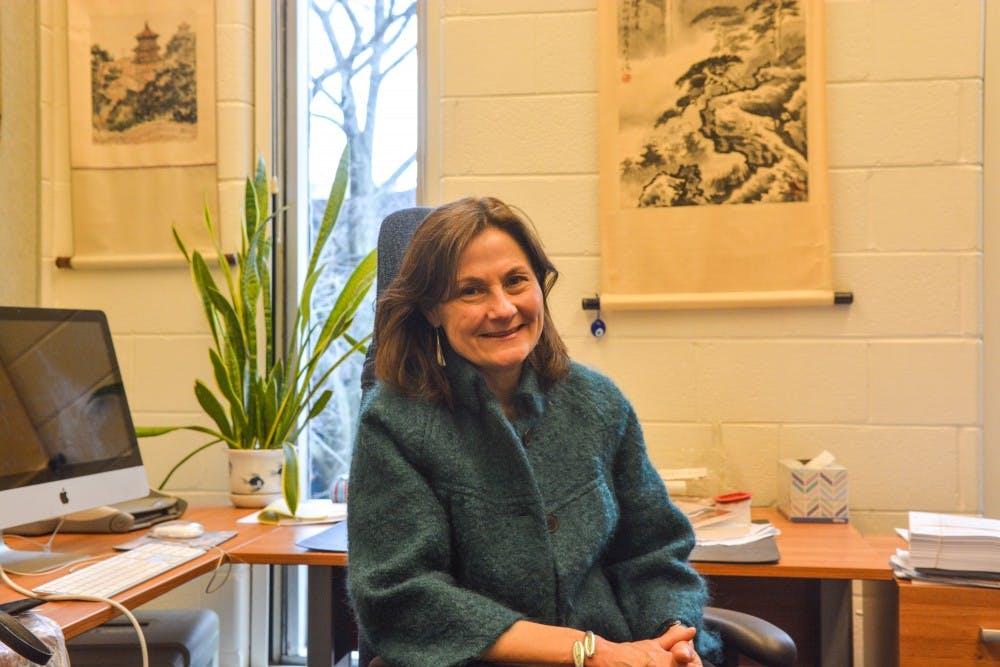Amid a political culture focused on racialized police brutality, the election of the self-proclaimed “law and order” candidate, and the recent Academy Award nomination of "13th" — an Ava DuVernay documentary about mass incarceration — the work of one Penn professor is now more relevant than ever before.
Marie Gottschalk, a professor in the Political Science Department, specializes in mass incarceration. Her work stretches from Hollywood to Washington, where Justice Sonia Sotomayor cited her book "Caught" in a dissenting opinion in the case Utah v. Strieff.
“None of us have six degrees of separation anymore from the criminal justice system,” Gottschalk said. “It’s metastasizing into our wider democracy and questioning the legitimacy of democracy in the United States.”
Despite many academics’ fears about the election of 1968 Wharton graduate Donald Trump, however, Gottschalk's concerns lie more with the lack of action taken by President Obama and Secretary of State Hillary Clinton during their tenure in office.
“There was so much more they could have done,” the recipient of degrees from Cornell University, Princeton University and Yale University lamented. “And they didn’t.”
Gottschalk criticized Obama and Clinton for publishing “high-profile essays” in the Harvard Law Review and The New York Times, while simultaneously overstating the potential for criminal justice reform in the nation’s capital.
“So many Penn students want to go to Washington and make change,” Gottschalk continued. “But if you want to make criminal justice reform change now, work at the state and local level. Nothing fundamental, in a progressive direction, is going to come out of Washington.”
And according to Gottschalk, approaching reform with a racial lens simply isn’t enough.
RELATED:
Speaker Marc Lamont Hill called for an end to the U.S. prison system
Alumni represent Penn in the Academy Awards
“The hardest edge of the criminal justice system is certainly on African Americans, and secondarily on Hispanics,” the professor said. “But punitive policies that are first imposed on African Americans migrate to other dispossessed populations.”
“Our police are trigger-happy,” Gottschalk continued, comparing rates of police brutality in the United States and Germany. “They’re just even more trigger happy with people of color.”
Attributing mass incarceration to racism, economic despair and our system of electing prosecutors and judges, Gottschalk added, “You don’t learn about mass incarceration in any fundamental way in law schools. Locking up people doesn’t reduce crime.”
As for Sotomayor’s Supreme Court opinion — in which she expressed concern for the weakening of Fourth Amendment rights — Gottschalk agreed.
“We are losing our rights. And the war on drugs and mass incarceration have led to that.”
“There’s nothing bright about what I do,” Gottschalk said, her demeanor reflecting the solemn nature of her work.
And she said the problem goes beyond just mass incarceration.
“I’d like to think this book 'Caught,'” Gottschalk said, “is really about the wider pathologies of American politics today. There’s a massive disconnect between the problems the country faces and the inability of the political system to address them.”
However, thanks to documentarian Ava DuVernay, there is a glimmer of hope.
“'13th' is wonderful,” Gottschalk said, describing the Oscar-nominated Netflix documentary in which she is featured.
“I think the chances are really good for '13th,'” Gottschalk said about the film’s potential Oscar win, “particularly in this political moment. I think people will vote for it, in part, to draw more attention to the issues in the film — especially in the wake of the election of Trump.”
But for Gottschalk, the most gratifying part of her job isn’t the celebrity. It’s the ability to make a positive impact.
“I’ve always wanted to be in the real world,” the professor said. “I’ve always wanted my work to travel outside of the academy.”
And travel it has.
“I get dozens and dozens of letters from people who are incarcerated,” Gottschalk said proudly. “The fact that people are reading my work behind bars, giving meaning to them [is profoundly pleasing.]"
“At the end of the day,” Gottschalk admitted, “I’m not going to change this.”
“It’s changing the message people get — making [people] see its importance.”









